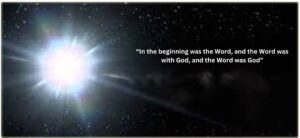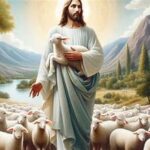John Chapter 1:1-51 King James Bible KJV

The Eternal Word, The Rejection and Reception of the Word, The Incarnation of the Word, the Testimony of John the Baptist, The First Disciples
John Chapter 1:1-51 King James Bible KJV. John Chapter 1 is one of the most theologically significant passages in the New Testament as it presents the profound foundation for understanding Jesus’ identity as both God and human, His divine nature, His role in creation and salvation, and the cosmic implications of His mission. The chapter emphasizes who Jesus is from a cosmic, eternal perspective, making it distinct from the other Gospels, which begin with narratives of Jesus’ birth or earthly ministry.
- Jesus as the Eternal Word: John emphasizes that Jesus is not just a historical figure but the pre-existent, divine Word of God, fully participating in the creation of the universe.
- Incarnation: God became human in the person of Jesus Christ, making Him the ultimate revelation of God’s nature and plan for humanity.
- Revelation and Rejection: Jesus is the light of the world, yet many rejected Him. However, those who believe are given new life and the right to become God’s children.
- Jesus as the Lamb of God: John the Baptist reveals that Jesus is the Lamb who will take away the sins of the world, pointing to His mission of redemption.
- Faith and Following: The chapter closes with the calling of the first disciples, who recognize Jesus as the Messiah and Son of God. Their response models the kind of faith and witness expected from believers.
John Chapter 1:1-51 King James Bible KJV
—————-

The Eternal Word – verses 1- 5
“In the beginning was the Word, and the Word was with God, and the Word was God.” John opens his Gospel with the Logos (Greek for “Word”), a term rich with both Jewish and Greek philosophical meaning. In this context, the “Word” refers to Jesus Christ, portraying Him as:
- Eternal: The phrase “in the beginning” echoes Genesis 1:1, linking Jesus (the Word) with the act of creation, and showing that He existed before time itself.
- Divine: “The Word was with God, and the Word was God.” This asserts that Jesus, the Word, is fully God, sharing in the divine nature and existing in eternal relationship with the Father.
- Agent of Creation: “Through Him all things were made” (verse 3). Jesus is not a created being but the Creator, active in making everything that exists.
- Source of Life and Light: “In Him was life, and that life was the light of men” (verse 4). Jesus is presented as the giver of both physical and spiritual life. Light is also symbolic of truth and salvation, illuminating a world darkened by sin and death.

The Rejection and Reception of the Word – verses 6-13
- John the Baptist: In verses 6-8, John introduces John the Baptist as a witness to the light (Jesus). John the Baptist’s role is to prepare the people for Jesus’ coming, though he himself is not the light.
- The World’s Rejection: “He came to that which was his own, but his own did not receive him” (verse 11). This refers to the fact that many people, including many Jews to whom Jesus was first sent, did not recognize or accept Him as the Messiah.
- The Power of Belief: Despite this rejection, “to all who did receive him, to those who believed in his name, he gave the right to become children of God” (verse 12). John introduces the concept of spiritual rebirth, where those who believe in Jesus are given the status of God’s children. This new birth is not based on human ancestry or will but on God’s power (verse 13).

The Incarnation of the Word – verses 1-14
“The Word became flesh and made his dwelling among us.” This is one of the most important verses in Christian theology:
- The Incarnation: This means that the eternal Word, who was with God and was God, became fully human in the person of Jesus Christ. The Greek phrase “made his dwelling among us” literally means “pitched his tent” or “tabernacled,” evoking images of God’s presence among His people in the Old Testament.
- Full of Grace and Truth: Jesus embodies the fullness of God’s grace (unmerited favor) and truth (revealed reality of God’s character and plan).
- Revelation of God: “We have seen his glory” (verse 14) refers to the fact that in Jesus, God’s glory (the weight of His divine presence) is revealed in a new, visible way.

The Superiority of Christ over John the Baptist – verses 15-18
John the Baptist acknowledges Jesus’ preeminence: “He who comes after me has surpassed me because he was before me” (verse 15). This speaks to the eternal existence of Jesus (He was “before” John even though He was born after him).
In verses 16-18, John emphasizes the abundant grace that believers receive through Jesus Christ. The law came through Moses, but grace and truth come through Jesus, bringing about a fuller revelation of God. Verse 18 makes it clear that Jesus, the “one and only Son,” is the perfect revelation of the invisible God, since no one has ever seen God the Father, but Jesus has made Him known.


The Testimony of John the Baptist – verses 10-34
This section focuses on John the Baptist’s ministry, where he clarifies that he is not the Messiah, Elijah, or the Prophet but is the one sent to prepare the way for Jesus, quoting Isaiah 40:3, “I am the voice of one calling in the wilderness, ‘Make straight the way for the Lord.’”
- The Lamb of God: John declares Jesus as “the Lamb of God, who takes away the sin of the world” (verse 29). This identifies Jesus with the sacrificial lamb of Jewish tradition, particularly during Passover, foreshadowing His role in the atonement for sin through His sacrificial death.
- Baptism with the Holy Spirit: John also testifies that while he baptizes with water, Jesus will baptize with the Holy Spirit (verse 33), pointing to the spiritual renewal and empowerment that Jesus will bring.

The First Disciples – verses 35-51
This section describes the calling of Jesus’ first disciples, beginning with Andrew and another disciple (likely John, the author of the Gospel). Andrew introduces his brother Simon Peter to Jesus, and Jesus gives Simon the new name “Cephas” (or Peter, meaning “rock”).
- Philip and Nathanael: Philip is called directly by Jesus, and he in turn invites Nathanael. Nathanael initially doubts that anything good can come from Nazareth (verse 46), but after Jesus reveals His divine knowledge of Nathanael’s character, Nathanael declares Jesus as “the Son of God” and “the King of Israel” (verse 49).
- The Heaven Opened: Jesus promises Nathanael that he will see “heaven open, and the angels of God ascending and descending on the Son of Man” (verse 51). This alludes to Jacob’s ladder in Genesis 28:12 and reveals that Jesus is the connection between heaven and earth, the ultimate mediator between God and humanity.
John Chapter 1:1-51 King James Bible KJV
1 In the beginning was the Word, and the Word was with God, and the Word was God.
2 The same was in the beginning with God.
3 All things were made by him; and without him was not any thing made that was made.
4 In him was life; and the life was the light of men.
5 And the light shineth in darkness; and the darkness comprehended it not.

6 There was a man sent from God, whose name was John.
7 The same came for a witness, to bear witness of the Light, that all men through him might believe.
8 He was not that Light, but was sent to bear witness of that Light.
9 That was the true Light, which lighteth every man that cometh into the world.
10 He was in the world, and the world was made by him, and the world knew him not.
11 He came unto his own, and his own received him not.
12 But as many as received him, to them gave he power to become the sons of God, even to them that believe on his name:
13 Which were born, not of blood, nor of the will of the flesh, nor of the will of man, but of God.

14 And the Word was made flesh, and dwelt among us, (and we beheld his glory, the glory as of the only begotten of the Father,) full of grace and truth.
15 John bare witness of him, and cried, saying, This was he of whom I spake, He that cometh after me is preferred before me: for he was before me.
16 And of his fulness have all we received, and grace for grace.
17 For the law was given by Moses, but grace and truth came by Jesus Christ.
18 No man hath seen God at any time; the only begotten Son, which is in the bosom of the Father, he hath declared him.

19 And this is the record of John, when the Jews sent priests and Levites from Jerusalem to ask him, Who art thou?
20 And he confessed, and denied not; but confessed, I am not the Christ.
21 And they asked him, What then? Art thou Elias? And he saith, I am not. Art thou that prophet? And he answered, No.
22 Then said they unto him, Who art thou? that we may give an answer to them that sent us. What sayest thou of thyself?
23 He said, I am the voice of one crying in the wilderness, Make straight the way of the Lord, as said the prophet Esaias.
24 And they which were sent were of the Pharisees.
25 And they asked him, and said unto him, Why baptizest thou then, if thou be not that Christ, nor Elias, neither that prophet?
26 John answered them, saying, I baptize with water: but there standeth one among you, whom ye know not;
27 He it is, who coming after me is preferred before me, whose shoe’s latchet I am not worthy to unloose.
28 These things were done in Bethabara beyond Jordan, where John was baptizing.
29 The next day John seeth Jesus coming unto him, and saith, Behold the Lamb of God, which taketh away the sin of the world.
30 This is he of whom I said, After me cometh a man which is preferred before me: for he was before me.
31 And I knew him not: but that he should be made manifest to Israel, therefore am I come baptizing with water.
32 And John bare record, saying, I saw the Spirit descending from heaven like a dove, and it abode upon him.
33 And I knew him not: but he that sent me to baptize with water, the same said unto me, Upon whom thou shalt see the Spirit descending, and remaining on him, the same is he which baptizeth with the Holy Ghost.
34 And I saw, and bare record that this is the Son of God.

35 Again the next day after John stood, and two of his disciples;
36 And looking upon Jesus as he walked, he saith, Behold the Lamb of God!
37 And the two disciples heard him speak, and they followed Jesus.
38 Then Jesus turned, and saw them following, and saith unto them, What seek ye? They said unto him, Rabbi, (which is to say, being interpreted, Master,) where dwellest thou?
39 He saith unto them, Come and see. They came and saw where he dwelt, and abode with him that day: for it was about the tenth hour.
40 One of the two which heard John speak, and followed him, was Andrew, Simon Peter’s brother.
41 He first findeth his own brother Simon, and saith unto him, We have found the Messias, which is, being interpreted, the Christ.
42 And he brought him to Jesus. And when Jesus beheld him, he said, Thou art Simon the son of Jona: thou shalt be called Cephas, which is by interpretation, A stone.
43 The day following Jesus would go forth into Galilee, and findeth Philip, and saith unto him, Follow me.
44 Now Philip was of Bethsaida, the city of Andrew and Peter.
45 Philip findeth Nathanael, and saith unto him, We have found him, of whom Moses in the law, and the prophets, did write, Jesus of Nazareth, the son of Joseph.
46 And Nathanael said unto him, Can there any good thing come out of Nazareth? Philip saith unto him, Come and see.
47 Jesus saw Nathanael coming to him, and saith of him, Behold an Israelite indeed, in whom is no guile!
48 Nathanael saith unto him, Whence knowest thou me? Jesus answered and said unto him, Before that Philip called thee, when thou wast under the fig tree I saw thee.
49 Nathanael answered and saith unto him, Rabbi, thou art the Son of God; thou art the King of Israel.
50 Jesus answered and said unto him, Because I said unto thee, I saw thee under the fig tree, believest thou? thou shalt see greater things than these.
51 And he saith unto him, Verily, verily, I say unto you, Hereafter ye shall see heaven open, and the angels of God ascending and descending upon the Son of man.
You must be logged in to post a comment.